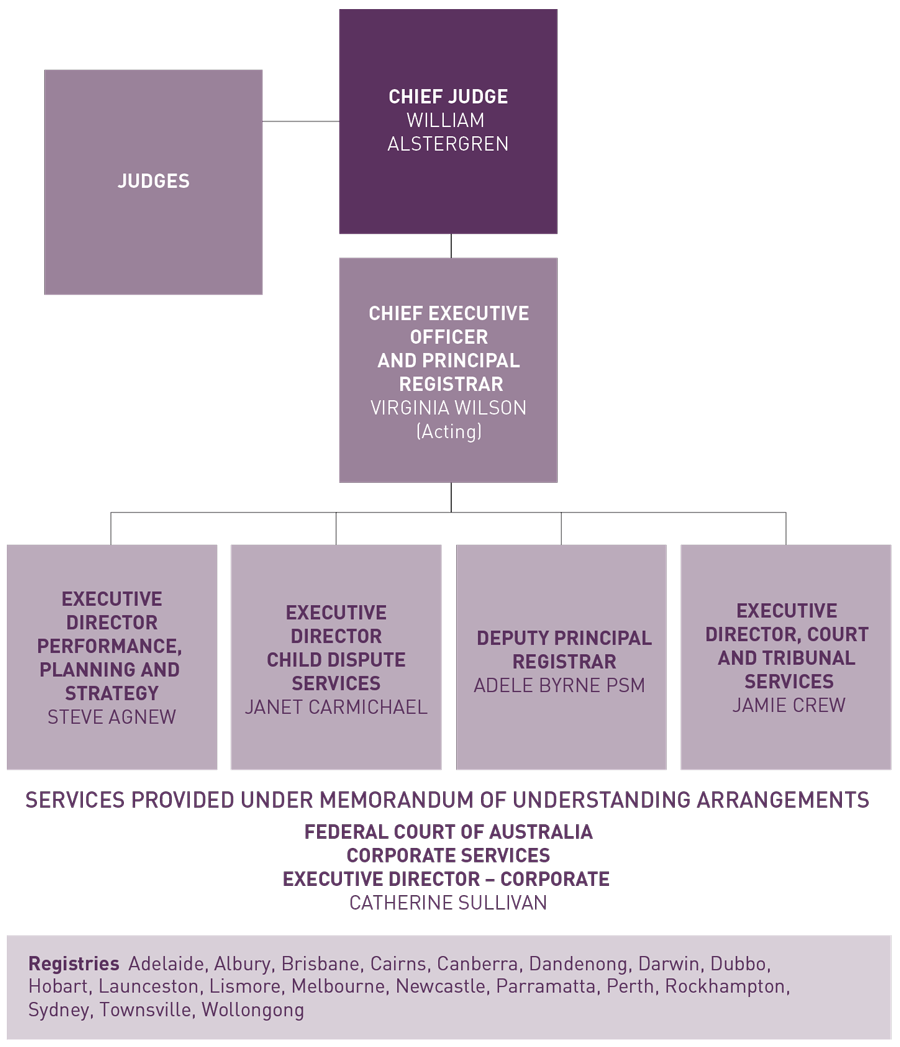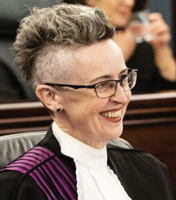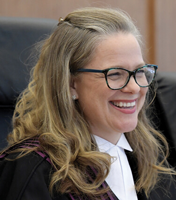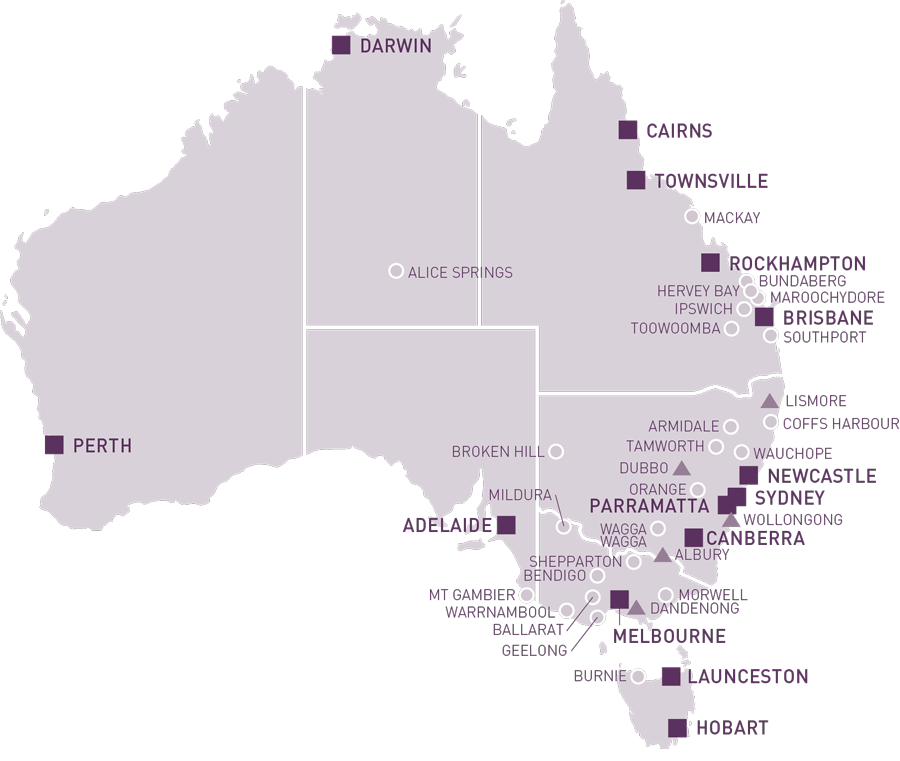About the Court
The Federal Circuit Court of Australia (Federal Circuit Court) was established by the Federal Circuit Court of Australia Act 1999 (the Act) as an independent federal court under Chapter III of the Australian Constitution. Prior to 12 April 2013, under the Federal Magistrates Act 1999, the Court was known as the Federal Magistrates Court and its judicial officers as federal magistrates. The Court was established to handle less complex matters in the areas of family law and general federal law.
The Court sits in all capital cities and selected major regional centres, and circuits to a number of regional locations. The Court is a federal court of record and a court of law and equity.
There were eight appointments in 2018–19. See page 22 for more information.
Objective
The provisions of the Act enable the Court to operate as informally as possible in the exercise of judicial power, use streamlined procedures and make use of a range of dispute resolution processes to resolve matters without judicial decisions.
Purpose
The purpose of the Federal Circuit Court is to provide a simple and accessible alternative to litigation in the Family Court of Australia (Family Court) and the Federal Court of Australia (Federal Court) and to provide efficient and effective registry services to assist the respective courts to achieve their stated purpose.
Jurisdiction
The jurisdiction of the Federal Circuit Court includes family law and child support and the following areas of general federal law: administrative law, admiralty law, bankruptcy, consumer law (formerly trade practices), human rights, industrial, intellectual property, migration and privacy. The Federal Circuit Court shares these jurisdictions with the Family Court (in respect of family law and child support) and the Federal Court (in respect of general federal law).
Family law and child support
The Federal Circuit Court exercises all aspects of jurisdiction in the Family Law Act 1975 with the exception of adoption and applications for nullity or validity of marriage. The Court has the same jurisdiction as the Family Court in relation to child support.
This includes:
- applications for divorce
- applications concerning spousal maintenance
- property disputes (including de facto jurisdiction)
- all parenting orders, including those providing for where a child lives, with whom a child spends time and communicates, and maintenance or specific issues
- enforcement of orders made by either the Federal Circuit Court or the Family Court
- location and recovery orders as well as warrants for the apprehension or detention of a child, and
- determination of parentage and recovery of child-bearing expenses.
Jurisdiction upon transfer from the Family Court
The Federal Circuit Court also has jurisdiction to hear any matter within the jurisdiction of the Family Court that the Family Court transfers to the Federal Circuit Court.
General federal law
The Federal Circuit Court deals with a wide range of matters, sharing jurisdiction with the Federal Court and, in some cases, state courts. The Court’s Rules and procedures are simpler and less formal and aim to reduce the cost and number of court appearances.
Where the Court has jurisdiction in a matter, it also has jurisdiction to determine associated or inseverable claims that would otherwise not be within jurisdiction.
Following is more information about the Federal Circuit Court’s jurisdiction in the various areas of general federal law.
Administrative
- Matters under the Administrative Decisions (Judicial Review) Act 1977.
- Judicial review of ‘child support first reviews’ under s 44AAA of the Administrative Appeals Tribunal Act 1975 (provided that the decision does not involve a presidential member).
- Appeals from the Administrative Appeals Tribunal (AAT) remitted from the Federal Court.
Admiralty
- In personam actions (claims against a specific person or company) such as freight claims, damage claims and seafarers’ wages.
- In rem actions remitted by the Federal Court and state supreme courts.
Bankruptcy
All civil claims and matters under the Bankruptcy Act 1966, except those requiring jury trials.
Consumer
Claims under the following provisions of the Competition and Consumer Act 2010 (formerly the Trade Practices Act 1974):
- Section 46 (Misuse of Market Power)
- Section IVB (Industry Codes)
- Part XI (Application of the Australian Consumer Law as a law of the Commonwealth), and
- Schedule 2 (Australian Consumer Law).
The Court can provide injunctive relief and award damages up to $750,000.
In relation to certain claims for $40,000 or less, litigants can elect to use the small claims procedure of the Court.
The Court also has civil jurisdiction with respect to claims under the National Consumer Credit Protection Act 2009.
There is provision in certain proceedings for a litigant to elect that an application for compensation be dealt with as a small claims proceeding.
Human rights
Federal unlawful discrimination matters under the Australian Human Rights Commission Act 1986 relating to complaints under the:
- Age Discrimination Act 2004
- Disability Discrimination Act 1992
- Racial Discrimination Act 1975, and
- Sex Discrimination Act 1984.
Industrial
Concurrent with the Federal Court, matters under the:
- Fair Work Act 2009
- Fair Work (Transitional Provisions and Consequential Amendments) Act 2009, and
- Workplace Relations Act 1996 (in so far as it continues to apply).
This jurisdiction is to be exercised by the Fair Work Division of the Court.
The Fair Work Act 2009 confers small claims jurisdiction on the Court for various matters if the compensation is not more than $20,000.
The Court also has some jurisdiction in relation to certain matters under the Independent Contractors Act 2006, the Fair Work (Registered Organisations) Act 2009 and the Building and Construction Industry (Improving Productivity) Act 2016.
Intellectual property (including copyright, trade marks and design)
Copyright – Copyright Act 1968
Civil claims and matters under Parts V, VAA, IX and s 248J of the Copyright Act 1968, such as claims for injunctions and damages for breach of copyright.
Trade marks – Trade Marks Act 1995
- Appeals from decisions of the Registrar of Trade Marks – ss 35, 56, 67, 83(2), 83A(8), 84A–84D and 104.
- Infringement actions – ss 120–128 and under ss 129 and 130.
- Revocation of registration under ss 88 and 89.
- Decision on whether a person has used a trade mark under s 7.
- Determining whether trade mark has become generic – ss 24, 87 and 89.
- Amendment or cancellation of registration under ss 85 and 86.
- Application for an order to remove a trade mark registration for non-use – s 92(3).
- Application for rectification of register by order of court under s 181.
- Variation of rules governing use of certification trade mark under s 182.
Design – Designs Act 2003
- Appeals from decisions of the Registrar of Designs – ss 28(5), 67(4), 68(6), 50(6), 52(7) and 54(4).
- Ability to make a determination of the entitled person during proceedings before the Court under s 53.
- Infringement actions under ss 71–76.
- Applications for relief from unjustified threats under ss 77–81.
- Application for compulsory licences under ss 90–92.
- Revocation of registration under s 93.
- For Crown use provisions, provide a determination of the term of use of a design under s 98.
- Application for a declaration by a court of any Crown use under s 101.
- Application for the cessation of Crown use of a design under s 102.
- Rectification of register under s 120D.
Migration
Most first instance judicial reviews of visa-related decisions of the AAT and the Immigration Assessment Authority. The Court does not have jurisdiction to undertake a merits review of these types of decisions.
Privacy
Enforcing determinations of the Privacy Commissioner and private sector adjudicators under the Privacy Act 1988.
Jurisdiction upon transfer from the Federal Court
Any matter within the jurisdiction of the Federal Court that the Federal Court transfers to the Federal Circuit Court.
Changes to the Court’s jurisdiction in 2018–19
The following Acts affected the jurisdiction of the Court:
- Counter-Terrorism Legislation Amendment Act (No. 1) 2018
- Intellectual Property Laws Amendment (Productivity Commission Response Part 1 and Other Measures) Act 2018
- Underwater Cultural Heritage Act 2018
- Imported Food Control Amendment Act 2018
- Private Health Insurance Legislation Amendment Act 2018
- Government Procurement (Judicial Review) Act 2018
- Regulatory Powers (Standardisation Reform) Act 2017
[Schedules 3–8 commenced on 6 November 2018. The following have been added to the list:- Industrial Chemicals (Notification and Assessment) Act 1989
- Horse Disease Response Levy Collection Act 2011
- Coal Mining Industry (Long Service Leave) Payroll Levy Collection Act 1992]
- Treasury Laws Amendment (Financial Sector Regulation) Act 2018
- My Health Records Amendment (Strengthening Privacy) Act 2018
- Road Vehicle Standards Act 2018
- Telecommunications and Other Legislation Amendment (Assistance and Access) Act 2018
- Industrial Chemicals Act 2019
- Treasury Laws Amendment (Strengthening Corporate and Financial Sector Penalties) Act 2019
- Corporations Amendment (Strengthening Protections for Employee Entitlements) Act 2019
- Criminal Code Amendment (Sharing of Abhorrent Violent Material) Act 2019
- Treasury Laws Amendment (Design and Distribution Obligations and Product Intervention Powers) Act 2019
- Treasury Laws Amendment (Improving Accountability and Member Outcomes in Superannuation Measures No. 1) Act 2019, and
- Treatment Benefits (Special Access) Act 2019.
Amendments to fee regulations
There are two fee regulations that apply to proceedings in the Court, one for general federal law proceedings and one for family law proceedings:
- Family Law (Fees) Regulation 2012, and
- Federal Court and Federal Circuit Court Regulation 2012.
Fee increases to items 103, 104, 209 and 210 of Schedule 1 of the Federal Court and Federal Circuit Court Regulation 2012 (applications in relation to dismissals in contravention of Part 3–1 of the Fair Work Act 2009) are calculated in accordance with regulations 3.02 and 3.03 of the Fair Work Regulations 2009.
Organisational structure


Judicial officers
Judges are appointed by the Governor-General by commission as justices in accordance with Chapter III of the Australian Constitution. A judge is appointed for a term expiring when they reach the age of 70 years.
Section 8 of the Federal Circuit Court of Australia Act 1999 provides that the Court consists of a Chief Judge and such other judges as appointed.
At 30 June 2019, 69 judges held appointment to the Court (including the Chief Judge).
The remuneration arrangements for all judicial officers and the Chief Executive Officer and Principal Registrar are governed by enforceable determinations of the Remuneration Tribunal (further details including relevant determinations are available at www.remtribunal.gov.au).
Table 2.1 lists the Federal Circuit Court judges as at 30 June 2019, and their location and appointment date.
| Judge | Location | Appointment date |
|---|---|---|
| Chief Judge | ||
| William Alstergren | Melbourne | 13 October 2017 |
| Judge | Location | Appointment date |
| Rolf Driver | Sydney | 31 July 2000 |
| Stewart Brown | Adelaide | 5 November 2001 |
| Shenagh Barnes | Sydney | 5 November 2001 |
| Michael Jarrett | Brisbane | 2 February 2004 |
| Sylvia Emmett AM | Sydney | 5 July 2004 |
| Grant Riethmuller | Melbourne | 19 July 2004 |
| Nick Nicholls | Sydney | 23 August 2004 |
| Kevin Lapthorn | Brisbane | 29 August 2005 |
| Kate Hughes | Canberra | 30 January 2006 |
| Heather Riley | Melbourne | 3 July 2006 |
| Philip Burchardt | Melbourne | 10 July 2006 |
| John O’Sullivan | Melbourne | 10 July 2006 |
| Antoni Lucev | Perth | 14 August 2006 |
| Robert Cameron | Sydney | 3 October 2006 |
| Tom Altobelli | Sydney | 13 November 2006 |
| Stephen Coates | Brisbane | 27 November 2006 |
| Leanne Spelleken | Brisbane | 11 December 2006 |
| Charlotte Kelly | Adelaide | 12 March 2007 |
| Janet Terry | Newcastle | 10 April 2007 |
| Warwick Neville | Canberra | 2 July 2007 |
| Dale Kemp | Sydney | 4 July 2007 |
| Paul Howard | Brisbane | 9 July 2007 |
| Susan Purdon-Sully | Brisbane | 15 October 2007 |
| Margaret Cassidy | Brisbane | 5 November 2007 |
| Evelyn Bender | Melbourne | 15 September 2008 |
| Anne Demack | Rockhampton | 22 September 2008 |
| Terry McGuire | Launceston | 6 October 2008 |
| David Dunkley | Parramatta | 13 October 2008 |
| Barbara Baker | Hobart | 27 October 2008 |
| Geoffrey Monahan | Sydney | 3 November 2008 |
| Peter Cole OAM | Adelaide | 24 November 2008 |
| Josephine Willis AM | Cairns | 27 January 2009 |
| Joseph Harman | Parramatta | 7 June 2010 |
| Leanne Turner | Brisbane | 7 June 2010 |
| Matthew Myers AM | Parramatta | 23 January 2012 |
| Ron Curtain | Melbourne | 23 January 2012 |
| Alexandra Harland | Melbourne | 15 April 2013 |
| Judith Small AM | Melbourne | 15 April 2013 |
| Nicholas Manousaridis | Sydney | 1 July 2013 |
| Joanne Stewart | Melbourne | 2 September 2013 |
| Alexander Street | Sydney | 1 January 2015 |
| Salvatore Vasta | Brisbane | 1 January 2015 |
| Ian Newbrun | Parramatta | 4 February 2015 |
| Tony Young | Darwin | 31 July 2015 |
| Steven Middleton | Townsville | 9 November 2015 |
| Timothy Heffernan | Adelaide | 23 November 2015 |
| Philip Dowdy | Sydney | 7 December 2015 |
| Elizabeth Boyle | Sydney | 29 February 2016 |
| Alister McNab | Melbourne | 18 May 2016 |
| Brana Obradovic | Parramatta | 30 May 2016 |
| Amanda Tonkin | Canberra | 1 January 2017 |
| Anthony Kelly | Melbourne | 6 February 2017 |
| Patrizia Mercuri | Melbourne | 25 September 2017 |
| Jane Costigan | Newcastle | 8 October 2017 |
| Gregory Egan | Brisbane | 18 December 2017 |
| Christopher Kendall | Perth | 29 January 2018 |
| Caroline Kirton | Melbourne | 29 January 2018 |
| Julia Baird | Sydney | 20 February 2018 |
| Terry Betts | Newcastle | 30 May 2018 |
| Bruce Smith | Sydney | 12 June 2018 |
| Karl Blake | Melbourne | 30 January 2019 |
| Douglas Humphreys OAM | Parramatta | 11 March 2019 |
| Monica Neville | Sydney | 11 March 2019 |
| Alice Carter | Melbourne | 14 March 2019 |
| Anna Boymal | Melbourne | 18 March 2019 |
| Anthony Dillon Morley | Sydney | 19 March 2019 |
| Guy Andrew | Townsville | 25 March 2019 |
| Penelope Kari | Adelaide | 25 March 2019 |
Appointments and retirements
There were eight appointments and seven retirements during 2018–19.
Appointments

Judge Karl Blake was appointed on 30 January 2019.


Judge Douglas Humphreys OAM was appointed on 11 March 2019.

Judge Monica Neville was appointed on 11 March 2019.

Judge Alice Carter was appointed on 14 March 2019.

Judge Anna Boymal was appointed on 18 March 2019.


Judge Anthony Dillon Morley was appointed on 19 March 2019.

Judge Guy Andrew was appointed on 25 March 2019.

Judge Penelope Kari was appointed on 25 March 2019.
Retirements
- Judge Suzanne Jones retired on 5 July 2019.
- Judge Jillian Williams was appointed to the Family Court of Australia on 8 February 2019.
- Judge Justin Smith was appointed to the District Court of New South Wales on 11 February 2019.
- Judge Joshua Wilson was appointed to the Family Court of Australia on 11 March 2019.
- Judge Robert Harper was appointed to the Family Court of Australia on 11 March 2019.
- Judge Christine Mead was appointed to the Family Court of Australia on 25 March 2019.
- Judge Norah Hartnett was appointed to the Family Court of Australia on 25 March 2019.
Court service locations


Australian Capital Territory
Canberra
Circuits to: Wagga Wagga.
New South Wales
Parramatta, Newcastle, Sydney
Circuits to: Armidale, Coffs Harbour, Dubbo, Orange, Tamworth, Wauchope and Wollongong.
Northern Territory
Darwin
Circuits to: Alice Springs.
Queensland
Brisbane, Cairns, Townsville, Rockhampton
Circuits to: Bundaberg,
Hervey Bay, Ipswich, Lismore, Mackay, Maroochydore, Southport and Toowoomba.
South Australia
Adelaide
Circuits to: Broken Hill
and Mt Gambier.
Tasmania
Hobart, Launceston
Circuits to: Burnie.
Western Australia
Perth
Victoria
Melbourne
Circuits to: Albury, Ballarat, Bendigo, Dandenong, Geelong, Mildura, Morwell, Shepparton and Warrnambool.